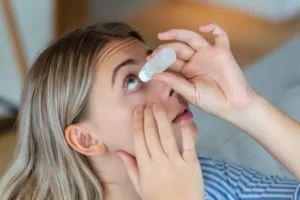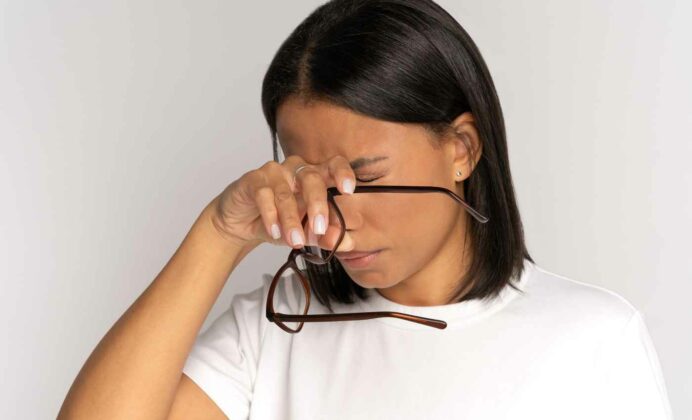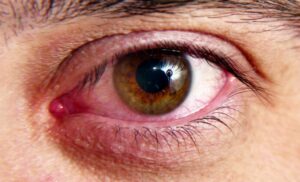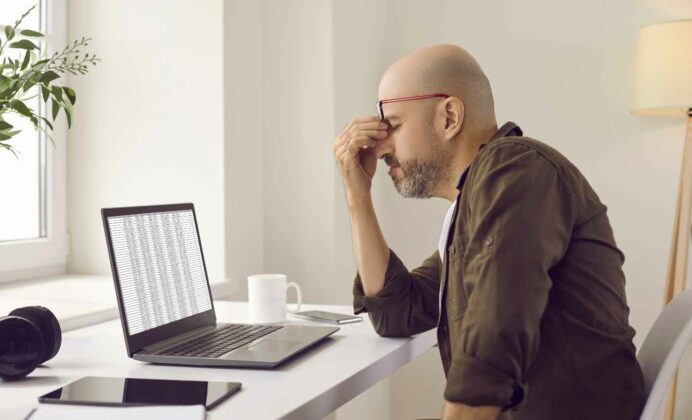Did you know that the blues can affect more than just your mood? Yes, we’re talking about depression – a common yet complex mental health condition that touches millions globally. But here’s something you might not have heard: depression can impact your eyesight. Surprising, right? While we often talk about the emotional toll of depression, its potential link to eye health flies under the radar. In this blog, we’re going to delve into the intriguing connection between depression and eye problems.
So, if you’ve ever wondered why your sight seems a bit off during low moods, or why your eyes feel strained, you’re in the right place. Join us as we explore how depression can affect your eyesight and discover what treatments can help manage both. Get ready to see the world of mental health and eye care in a new light!”
Contents
Depression And Eye Problems: The Link
When we think about depression, we often consider its emotional symptoms, like sadness or a lack of interest in activities. However, depression’s impact goes beyond our emotions – it can also affect our physical health, including our eyesight. So, how does this mental health condition influence our vision?
- Physiological Stress Response: Depression activates the body’s stress response system, which can lead to various physiological changes. These changes can affect the eyes, leading to alterations in tear production and composition, resulting in dry eyes or discomfort.
- Neurological Changes: Depression impacts the brain’s neurotransmitter activity and alters the way the brain processes information, including visual stimuli. These changes can lead to blurred vision, light sensitivity, and other visual disturbances.
- Medications: Some medications used to treat depression, such as SSRIs (Selective Serotonin Reuptake Inhibitors), have ocular side effects, meaning they could lead to blurred vision or changes in visual depression.
- Neglect of Self-Care: People with depression often struggle with motivation and energy, making it challenging to engage in self-care routines, including eye care. Neglecting regular eye exams or not wearing prescribed glasses or contact lenses can worsen existing eye problems.
- Lifestyle Factors: Depression can lead to changes in lifestyle and daily routines. People with depression may be less likely to engage in outdoor activities or maintain a balanced diet, which can indirectly impact eye health.
- Stress and Anxiety: Eye problems, such as discomfort, light sensitivity, or blurred vision, can cause stress and anxiety. These emotions can worsen depression symptoms or trigger depressive episodes in some individuals.
- Psychosomatic Effects: In some cases, psychological distress, such as depression, can lead to psychosomatic symptoms, where emotional stress and psychological factors contribute to physical symptoms, including eye problems.
Eye Problems Due to Depression

When you’re grappling with depression, it’s not just your mood that’s affected – your vision might change too. Understanding these changes is crucial, as it helps you identify if your eye problems might be linked to your mental health. Here’s what you might experience. Some common vision-related symptoms associated with depression:
- Dry Eyes: Depression can disrupt the body’s normal processes, including tear production. Additionally, certain medications used to treat depression can have dry eyes as a side effect.
What You Might Feel: A persistent dry, scratchy feeling in your eyes, or a sensation as if something is in your eye. You may also experience redness or a watering of the eyes that is the body’s response to the dryness. - Blurred Vision: Depression can impact the brain’s ability to process visual information, resulting in a temporary blurring of vision.
What You Might Feel: Objects and details that were once clear might now seem fuzzy or out of focus. Reading or recognizing faces from a distance could become challenging. - Sensitivity to Light (Photophobia): Depression can heighten sensory sensitivity, making normal light levels feel harsh and uncomfortable.
What You Might Feel: Bright lights, whether artificial or natural, might seem overwhelmingly intense, causing discomfort or a need to squint or look away. - Eye Strain: The fatigue and concentration issues common in depression can strain the eyes, as they have to work harder to focus.
What You Might Feel: A sensation of tired or sore eyes, especially after tasks like reading, working on a computer, or focusing on small objects. - Difficulty Focusing Vision: Neurological changes in depression can affect the eye muscles’ ability to adjust focus swiftly and accurately.
What You Might Feel: Trouble keeping a visual lock on moving objects or shifting focus from one object to another quickly. - Visual Floaters or Spots: While often a normal part of vision, stress and fatigue from depression can make you more aware of them or increase their frequency.
What You Might Feel: Small, floating spots or shapes that drift across your field of vision, especially noticeable against plain backgrounds. - Changes in Visual Perception: Depression can dull sensory perception, including visual cues like color intensity and depth.
What You Might Feel: Colors might seem less vibrant, or you might find it harder to judge distance or contrast.
If you’re facing any of these symptoms along with depression, it might be more than a coincidence. Therefore, it is very important to recognize that even though depression can cause eye problems, the primary focus should be on managing the symptoms of depression.
Depression is a condition that requires continuous professional support whether through therapy, medication, or lifestyle changes.
**A crucial aspect of preventing and managing depression is emotional and physical well-being. MantraCare is an online platform that offers personalized emotional and physical well-being solutions. It offers a wide variety of programs including online depression therapy to help people deal with depression.**
Managing Depression Related Eye Problems
Managing depression-related eye problems requires a multi-faceted approach that addresses both the underlying depression and the specific eye-related symptoms. Here’s an elaboration on how to effectively manage these issues:
Medical Treatment Options

- For Depression
Antidepressants can help balance the chemicals in your brain that affect your mood and, consequently, some of the vision issues. It’s important to discuss with your doctor the best medication options, especially if you’re experiencing eye-related side effects. - For Eye Problems
Depending on the specific eye issue, treatments can range from lubricating eye drops for dry eyes to corrective lenses if your vision is affected.
Lifestyle Changes

- Regular Exercise
Physical activity can help improve mood and reduce symptoms of depression. It also boosts overall health, which can positively impact eye health. - Healthy Diet
A diet rich in vitamins and nutrients, especially those beneficial for eye health (like vitamins A, C, and E, and omega-3 fatty acids), can support both your mental and visual well-being. - Adequate Sleep
Good sleep hygiene is crucial for mental health and can also help alleviate eye strain and fatigue.
Therapies

- Professional Help
If you are experiencing depression, it’s essential to seek professional help. A mental health therapist or psychiatrist can provide therapy, counseling, or medication, depending on the severity of your depression. Effective management of depression is the primary step in alleviating its impact on your eye health. This is something that TherapyMantra could help you with. - TherapyMantra is your all-in-one solution for healing and well-being. You can access it from the comfort of your home. It connects you with trained therapists and offers affordable, effective online therapy for a variety of mental health challenges, including depression, anxiety, PTSD, stress, and anger. You can find the support you’re looking for to navigate hardships and find a path to emotional wellness.
- Cognitive-Behavioral Therapy (CBT)
This form of therapy is effective in treating depression and can also help manage the stress and anxiety that might be contributing to eye problems. - Relaxation Techniques
Practices like meditation, yoga, and deep breathing can reduce stress, which in turn can help alleviate some of the eye symptoms linked to depression.
Regular Eye Check-Ups
Regular visits to an eye care professional can help monitor and manage any changes in your vision, ensuring that any depression-related eye problems are addressed promptly.
Eye Care Practices

- Proper Lighting and Screen Use
Ensure that you have proper lighting when using digital screens, and maintain good screen ergonomics to reduce eye strain. Taking regular breaks during extended screen time allows your eyes to rest and can help reduce eye strain. - Lubricating Eye Drops
If you experience dry eyes, consider using artificial tears or lubricating eye drops as recommended by your eye care specialist to relieve discomfort. - Reduce Eye Strain
Adjust your screen settings, fonts, and text size to reduce eye strain when reading or working on a computer. Remember to blink frequently to keep your eyes moist.
Mindfulness and Stress Management
Techniques like mindfulness meditation can help in managing both depression and the stress that can exacerbate eye problems.
By combining these treatment strategies, you can effectively manage the eye problems associated with depression. Remember, it’s important to work closely with both your mental health and eye care professionals to find the best treatment plan for your specific needs.
Conclusion
In conclusion, the connection between depression and eye problems only highlights how our emotional and physical health may be linked. While depression primarily affects our mental health, it can also lead to physiological symptoms. Understanding this connection is crucial for overall comprehensive healthcare.
Managing depression-related eye problems involves a holistic approach, addressing both the underlying depression and specific eye symptoms. It is important to seek professional help for depression and practice good eye care for a good overall lifestyle By taking care of your mental health and paying attention to your eye health, you can work toward a life of clarity.
Are your eyes craving attention? It’s time to prioritize your eye health! Book your free appointment now at Best Eye Hospital in India or call us on 9711116605





